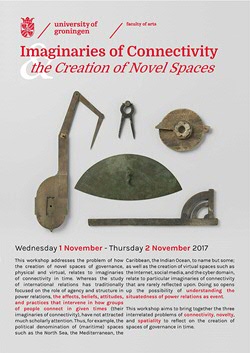Workshop "Imaginaries of Connectivity & the Creation of Novel Spaces"

On Wednesday 1 and Thursday 2 November 2017, the chair group History and Theory of International Relations organised its annual Modes of Reasoning workshop. This time the workshop brings together the three interrelated problems of connectivity, novelty, and spatiality to reflect on the creation of spaces of governance in time.
The theme
Whereas the study of international relations has traditionally focused on the role of agency and structure in power relations, the affects, beliefs, attitudes, and practices that intervene in how groups of people connect in given times (their imaginaries of connectivity), have not attracted much scholarly attention. Thus, for example, the political denomination of (maritime) spaces such as the North Sea, the Mediterranean, the Caribbean, the Indian Ocean, to name but some; as well as the creation of virtual spaces such as the Internet, social media, and the cyber domain, relate to particular imaginaries of connectivity that are rarely reflected upon. Doing so opens up the possibility of understanding the situatedness of power relations as event.
Inasmuch as new spaces of connectivity are understood as created, they relate also to claims of novelty, as the human ability ‘to introduce absolute beginnings into reality’ (Blumenberg 1985, 169). Similarly, for Arendt, it is action – as a mode of human togetherness – that introduces novelty into the world (Arendt 1998). While the possibility of the new is thus a necessary condition for politics, the human capacity for novelty has also historically produced large-scale destruction of both existing human societies and the planetary environment. On the other hand, novelty as a particularly human capacity has been recently called into question by various nonanthropocentric perspectives (Roudavski and McCormack 2016; Braidotti 2013; Harman 2005). Dislocating the production of novelty from the human subject poses important questions regarding the possibility of governing such novel spaces as well as the possibility of practicing politics in their midst.
Keynote: Ricardo Padron, University of Viriginia
"Smooth Sailing on the Ocean Sea: Maritime Mapping the South Sea in the Sixteenth Century"
The Ancient and Medieval tradition taught early modern Europe to identify the Ocean Sea as a space fundamentally inhospitable to human habitation, and bequeathed to it a tendency to denounce the art of navigation as vain, foolhardy, and inevitably perilous. Yet as Europeans learned to venture far from the coast, and even to cross oceanic spaces on a regular basis, attitudes toward the ocean changed. The shift was rendered visible by new approaches to mapping the ocean, and by the emergence of a new rhetoric through which to figure oceanic navigation. In this lecture, I trace how this shift took place in Spanish approaches to the ocean that proved most problematic to early modern navigation, as well as to the new cartography and rhetoric that went with it, the Pacific.
Programme
| Wednesday 1 November | |||
| Location | Time | Speaker | Title |
| A8, Academy Building | 14:00-14:15 | Registration | |
| 14:15-13:30 | Luis Lobo-Guerrero | Introduction | |
| 14:30-15:20 | Andonea Dickson | Hierarchies of Power In and Through the Materiality of the Maritime | |
| Bruinszaal | 15:20-15:50 | Break | Coffee |
| A8, Academy Building | 15:50-16:40 | Zeynep Gulsah Capan and Filipe dos Reis | Imagining Empire: Cartography and Colonialism in 19th C. Germany |
| 16:40-17:20 | Luis Lobo-Guerrero | Novelty, Modernity and Globality in early XVI C Spain | |
| Offerhauszaal, Academy Building | 17:30-19:00 | Keynote: Ricardo Padron |
Smooth Sailing on the Ocean Sea: Maritime Mapping the South Sea in the Sixteenth Century
|
| Thursday 2 November | |||
| Location | Time | Speaker | Title |
| A3, Academy Building | 9:30-10:20 | Ariel Shangguan | China and/in 'the International': the formation of the Chinese geopolitical imaginary in the nineteenth century |
| 10:20-11:10 | Stephen Aris | Connecting Eurasia: The spatial politics of OBOR and the remaking of Eurasian governance | |
| Bruinszaal | 11:10-11:30 | Break | Coffee |
| A3, Academy Building | 11:30-12:20 | Sujin Eom | After Ports Were Linked: Connected Worlds, Networked Spaces, and New Urban Forms |
| 12:20-13:10 | Michael Shapiro | Urban Punctualities: Symphonic and Dialectic | |
| Bruinszaal | 13:10-14:00 | Lunch | Lunch |
| A3, Academy Building | 14:00-14:50 | Camila del Marmol | Cultivating Disconnection: imaginaries of rurality in the Catalan Pyrenees |
| 14:50-15:40 | Paolo Palladino | What endures? Organisms, biological constructs and connectivity | |
| Bruinszaal | 15:40-16:00 | Break | Coffee |
| A3, Academy Building | 16:00-16:50 | Michael Dillon | Making Infinity Count |
| 16:50-17:30 | Conclusions | ||
| Last modified: | 09 November 2017 2.06 p.m. |
